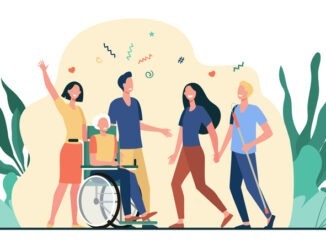
Self-esteem is how we value and perceive ourselves. It’s based on our opinions and beliefs about ourselves, which can sometimes feel really difficult to change
CREDIT: This is an edited version of an article that originally appeared on Mind
Your self-esteem can affect whether you:
- like and value yourself as a person;
- are able to make decisions, and assert yourself;
- recognise your strengths and positives;
- feel able to try new or difficult things;
- show kindness towards yourself;
- move past mistakes without blaming yourself unfairly;
- take the time you need for yourself;
- believe you matter and are good enough;
- believe you deserve happiness.
What can cause low self-esteem?
The things that affect self-esteem are different for everyone. Your self-esteem might change suddenly, or you might have had low self-esteem for a while – which might make it hard to recognise how you feel and make changes. Difficult or stressful life experiences can often be a factor, such as:
- being bullied or abused;
- experiencing prejudice, discrimination or stigma, including racism;
- losing your job, or difficulty finding employment;
- problems at work or while studying;
- ongoing stress;
- physical health problems;
- mental health problems;
- relationship problems, separation or divorce;
- worries about your appearance and body image;
- problems with money or housing.
You might have had some of these experiences, and you might also have had difficulties that aren’t listed here – or there might not be one particular cause.
How can I improve my self-esteem?
Be kind to yourself
- Get to know yourself. Try to learn more about yourself – for example, what makes you happy and what you value in life. Some people say they find it helpful to write these things in a journal.
- Let yourself have feelings. It’s important to remember that you’re a human being who can experience a wide range of emotions.
- Consider what self-esteem means to you. You might realise you’re basing your sense of self-worth on things that aren’t useful or helpful for you.
- Try to challenge unkind thoughts about yourself. You might automatically put yourself down. If you find yourself doing this, it can help to ask, “Would I talk to, or think about, a friend in this way?”
- Avoid comparing yourself to others. Try to remember that what other people choose to share about their lives isn’t the full picture and comparing ourselves isn’t realistic.
- Say positive things to yourself. It might feel really strange at first, but you’ll feel more comfortable the more you do it.
Try to notice the good things
- Celebrate your successes. No matter how small they may seem, take time to praise yourself and notice what you did well. It could also help to remember past successes.
- Accept compliments. You could make a note of them to look over when you’re feeling low or doubting yourself.
- Ask people what they like about you. It’s likely that they see you differently to how you see yourself.
- Don’t put too much weight on negatives. If someone says something unhelpful or unkind, you might find you focus on that and ignore anything positive.
- Write a list of things you like about yourself. For example, you could include character traits, skills or experience, beliefs or causes that matter to you, or things you enjoy doing. You could ask other people for suggestions too.
Build a support network
- Talk to someone. For example you can contact Samaritans 24 hours a day, 365 days a year, on 116 123 – or jo@samaritans.org – to talk about anything that is upsetting you.
- Try peer support. Making connections with people who have similar or shared experiences can be really helpful. For example, online communities like Mind’s Side by Side can be a good source of support. See our pages on peer support and online mental health for more information.
- Contact your local Mind. Mind’s Infoline can help you explore options for support.
Learn to be assertive
- Practise saying ‘No’. It could help to pause, take a breath, and consider how you feel before agreeing to do something you don’t want to.
- Give it time. Being assertive can feel difficult if you’re not used to it, but it can feel liberating – and it gets easier the more you do it.
- Don’t take too much on. It’s OK to set boundaries around how much you do for other people. Over-stretching yourself to please others can drain your energy and affect your wellbeing.
Courses to help with self-esteem
Some organisations offer courses or workshops to help you build your self-esteem or learn assertiveness, including:
- Local Mind branches.
- The Richmond Fellowship.
- Recovery colleges – see the Mind Recovery Net website for more information.
The Reading Well books scheme includes books which can help your self-esteem – Reading Well books are available in many local libraries. The organisation Mind Tools also provide further tips on assertiveness on their website.



Be the first to comment